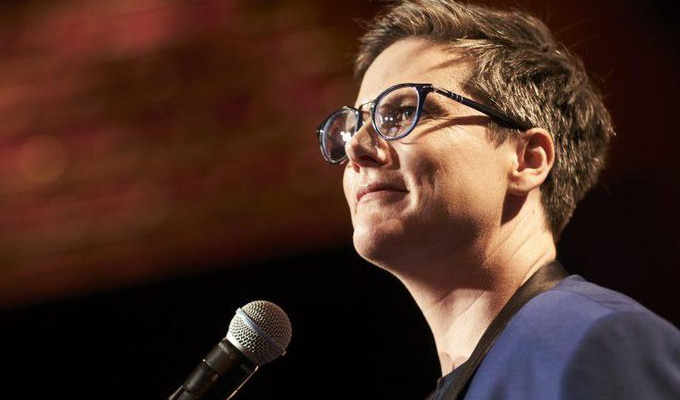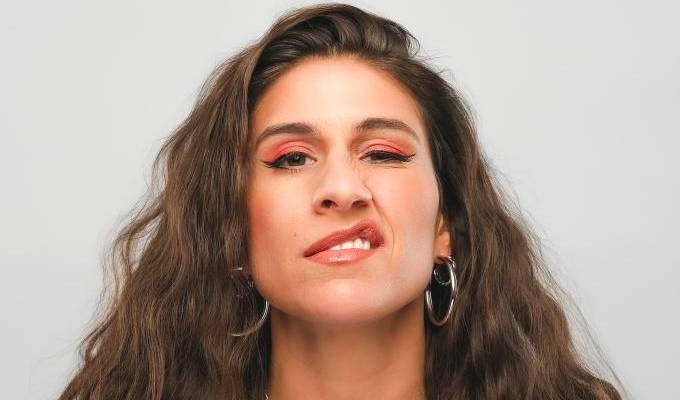
Hannah Gadsby: Nanette on Netflix
Note: This review is from 2018
Review by Steve Bennett
To say that a stand-up special has fundamentally shifted the essence of what comedy can be would normally be considered hyperbole. But when talking of Hannah Gadsby’s potent, if spuriously named, Nanette, it barely seems enough.
The hour certainly upends convention. As Gadsby explains, a joke can be stripped down to a set-up, which creates tension, and a payoff that diffuses it. Yet over the hour, the pressure she ratchets up with an unshakeable sense of purpose, clarity and passion is not given the easy release of a punchline.
She is determined to challenge a malignant society that has irreparably damaged her, and so many others like her, using her powerful and emotionally eviscerating story to make the world sit up and take notice.
She is driven by the anger of how she’s been treated as a woman, as a lesbian, and as someone who doesn’t fit into many conventional boxes, but is intent on not spreading that destructive feeling.
Instead, her audience are moved to sadness, understanding and hopefully defiance by her passionate climax, a speech of such impact that it would sit more easily next to the seismic oratory of Martin Luther King than with her Netflix stand-up compadres.
The filming of this set at the Sydney Opera House amplifies the intensity, too, with the camera unflinchingly holding her anguished, rightfully aggrieved face in tight close up as she bares her soul, releasing a lifetime of repressed expression. No cutaway shots break the spell.
What will stick with you from her hour-long special is the sucker-punch to the soul, the lump in your throat, and the indignity at how callous the world can be. But there is more to it than that… because it is funny too.
Her first experiences of society’s toxicity came with her dawning sexuality in Tasmania, where being gay was, shockingly, a crime until 1997.
The environment of hate and fear was not only external, but also led to Gadsby hating herself. That every portrayal of homosexuality was the extravagance of the Mardi Gras added to her sense of being an outsider. Her story, as a quiet person with a lifestyle she could barely ‘flaunt’ in a parade, was never heard. And that gap between her experiences is a place for laughs.
However, Gadsby’s comedy, to this point, has reflected the self-loathing that came to infest her, with her stand-up focussed on the self-deprecating. But she has come to realise that for someone who already exists in the margins, such humour ‘is not humility it’s humiliation’. That is why she had reappraised not only her whole approach to comedy but made her question whether she even should be doing it any more, for the sake of her mental health. For the prism of comedy has, ultimately, put a twist on the truth that is probably not in her best interests.
But before we get to the impactful, joke-free rhetoric in the last section of the show, Gadsby serves up a thoughtful and funny exploration of how she got here.
Questions of identity are shot through her material, as someone who doesn’t comply with many archetypes. But while underpinned by serious points, she can discuss the weird things gender-normal people do with the astute, amusing eye of a skilled observational comic, or offer a breakdown of the versatility of the word ‘blue’ in various figures of speech that is positively Seinfeldesque in its universal appeal and forensic wit.
The penetrating hour also raises the questions of how we debate in public, with interactions with those with whom we disagree becoming more and more toxic, as well as highlighting the way men have misused their power over the centuries.
In this, she draws upon her knowledge of art history, discussing how she is unable to separate the art from the artist. From Picasso to Bill Cosby, she rejects the notion that the reputation of these manipulative men should let us forget the women or children they abused.
And in speaking of the common image of Vincent Van Gogh, she warns about the romanticising of mental illness as impetus for creativity, while rejecting the idea that he was an artist before his time.
‘Artists don’t invent zeitgeists, they respond to them,’ Gadsby argues. And what a response she has offered. Nanette is one of the most compelling, insightful, deeply personal, and momentously hard-hitting comments to today’s zeitgeist you could hope to encounter.
• Nanette was released on Netflix yesterday. Watch here.
Review date: 20 Jun 2018
Reviewed by: Steve Bennett







